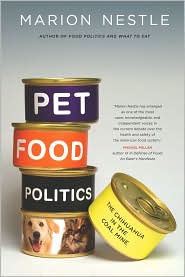Many pet owners remember that beginning in March 2007, many major pet food manufacturers began recalling popular lines of pet diets. Iams, Eukanuba, and Blue Buffalo were among the many popular brands of dog and cat food that were pulled from the shelves of grocery stores, pet stores, and veterinary offices. Anger and confusion set in among many pet owners, as foods that had been promoted as safe and healthy for our companions were removed and considered possibly dangerous. Understandably, many pet owners felt betrayed and lost trust in pet food manufacturers. Worst of all, many dogs and cats lost their lives from eating contaminated product.
Pet Food Politics begins by tracing the roots and causes of the recall. Many pet food companies, as it turns out, outsource the manufacturing of their pet foods to a pet food manufacturer. The manufacturer produces the foods in accordance with the companies' manufacturing specifications (the "recipes," so to speak). By producing many companies' pet foods, a manufacturer (such as Menu Foods) can take advantage of economies of scale to purchase ingredients for less and consolidate production to usually produce the foods at a cheaper cost than the pet food companies could do on their own. (Thus, at least up until the recall, many of the "high end" foods including varieties of Science Diet, Royal Canin, and Natural Balance were made by the same manufacturer that made low-cost competitors such as Walmart's Old Roy.)
Like many other products, many pet food ingredients such as wheat gluten are often available for less overseas. Menu Foods purchased its wheat gluten from Chinese companies. Oftentimes, food manufacturers find it easier to deal with a "go-between" or broker, that specializes in obtaining the low-cost overseas products for them rather than dealing with the ingredients' producers themselves. One of these companies, ChemNutra, provided Menu Foods with wheat flour that had melamine added to make it appear as the much more expensive wheat gluten.
Shortly after the food recall was first announced, Cornell researchers discovered that elevated melamine was common to the foods in the ill and dying patients. They remained perplexed however, as the only research available on melamine (all old, out of date studies), showed that it was dangerous only at much higher levels. It took a few more weeks for veterinarians at UC Davis to discover that, when mixed with the compound cyanuric acid, melamine was dangerous even at much lower doses.
As alarming as the background behind the recalls is, Nestle also details corporations quick to claim innocence and denial. All of the major players denied responsibility and tried to shift blame to others. Consider that at one point or another:
-Menu Foods blamed ChemNutra for the laced wheat "gluten" it used.
-ChemNutra claimed innocence, and stated they were only "brokers" and were never owners of the product themselves.
-Xuzhou Anying ("owners" of the product that ChemNutra provided Menu Foods), stated that they too, didn't actually manufacture product, only purchased it themselves from 25 manufacturers throughout China. Even worse, Xuzhou Anying officials were at one point quoted as stating "The poisoning of American pets has nothing to do with China."
Sadly, neither Nestle nor the FDA were able to find the actual manufacturers of the laced product, and, given the complexities of our food supply, are unlikely to ever do so.
I strongly recommend Pet Food Politics. It's part mystery, part drama, and part tragedy. It tells of a mystery illness that seemingly came out of nowhere to claim hundreds, maybe thousands, of lives. It details the drama of veterinarians, universities, pet food companies, and an understaffed FDA racing to find a cause. The tragedy is not without its villains (you'll have to read it to see who were the most egregious offenders) and its heroes: Nestle singles out the pet food maker Castor and Polluck's, the San Francisco based pet store Pet Express, and Internet journalists for being open and proactive during at the height of the crisis. (The FDA, severely underfunded and under tremendous pressure from the public, journalists, and pet food companies, also comes across fairly well.) Finally, it's a cautionary tale: Nestle details the major reforms that are needed in the way we deal with food production, both for pets and humans, if we're to avoid future episodes. And, given the interconnections of our food supply, one that can't simply be solved by avoiding pet foods altogether.
